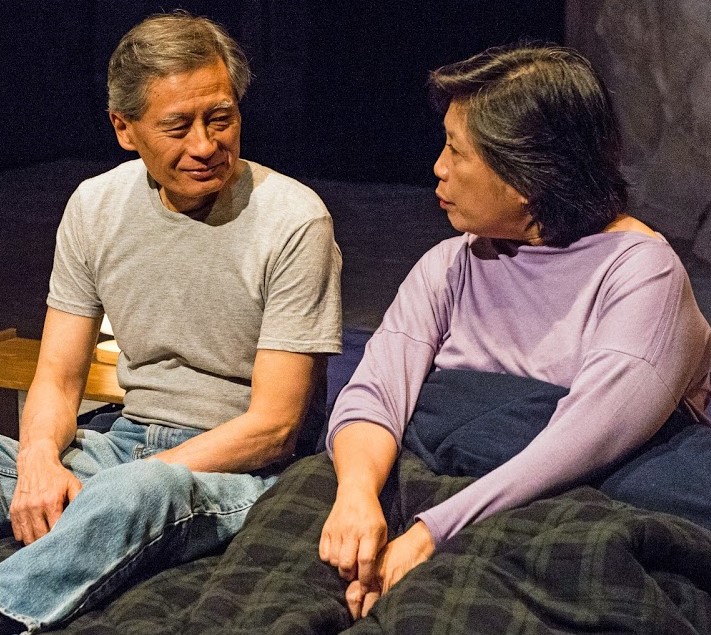MJ Kaufman’s latest play, Sagittarius Ponderosa, tells the story of a young man returning home to help take care of his ailing father. The play, staged by the National Asian American Theatre Company (NAATCO), begins at a Thanksgiving dinner with the young man, his father and mother, and his grandmother expressing what each is grateful for. This opening scene is telling. On one hand, it’s a precursor to many familiar stories: a young person returning home attempting to make his way in the world, and his struggle with sexuality, love, and attachment; a child taking care of an elderly parent; a wife coming to terms with the eventual death of her husband; a grandmother’s struggle with hearing issues, and, more important, her desire to see her grandchild married. Even though Kaufman sets Sagittarius Ponderosa squarely within an Asian-American family, each of these stories is universal.
What makes the opening dialogue of Sagittarius Ponderosa intriguing is that the lead character, Archer, played by Bex Kwan, is referred to as “Angela” by the grandmother. Grandma (Virginia Wing) appears confused, which is played off as an issue with her hearing, but rather it’s her coming to some understanding that Angela is now Archer. The parents, although a bit baffled themselves, are more accepting of the "genderqueer" aspect to their child, now looking more and more like a young man. Their struggle is with Archer’s distance, not just in his thin, curt conversations, but also in taking on household chores. Archer may have come home to support his ailing father, but he isn’t much help, to the mother’s chagrin.
Wing plays Grandma with all the charm and care one could ever want from a grandmother. The character is so consumed with Angela’s getting married that she adds a love potion to his tea, which Archer switches on her, leading to her own affection for the would-be object of her grandson, her next-door neighbor Peterson, and a shared love of the morning newspaper and eventually each other. Interestingly, Kaufman chose to write Peterson in as a puppet; he is manipulated by the father. If it is a metaphor, it is not fully developed in the narrative.
Glenn Kubota and Mia Katigbak play Archer’s parents. Kubota’s Pops is perfectly gentle, just wanting to sneak out for his sugar fix (in contrast to his vocal portrayal of Peterson, which is delightfully stilted and quirky). Katigbak plays Mom as the steadfast taskmaster in the family, whether she is chastising Archer for not taking out the trash or trying to get Grandma to wear hearing aids. Katigbak’s portrayal of the devastated wife, who struggles to get out of bed after her husband passes on, is extremely touching. Later, she also has an incredible interchange with Archer’s love interest, Owen, played by the charismatic and fresh Daniel K. Isaac.
The challenge with Kaufman’s writing in Sagittarius Ponderosa is the short, stilted scenes, which seem more appropriate for television than the stage. It is particularly evident in the development of the relationship between Archer and Owen. While the script clearly refers to Angela/Archer as “genderqueer,” it is never a topic of conversation with Owen either before or after they have sex or when Owen wants to get together again. It is confusing to guess whether Archer is trans, but clearly their relationship begins with two men kissing.
The set design by Kimie Nishikawa is striking in its modern, clean lines for the family home and the sweet room for the grandmother, but on a traverse staging, with audiences on two sides of a central playing area, it doesn’t lend itself well to scene changes. Oddly though, Nishikawa constructed a large column covered in pieces of white fabric, lit from behind, to represent the ponderosa trees of Central Oregon. It seemed terribly out of place, and again a metaphor for something that is never quite conveyed. Oliver Wason has made the smart lighting choices, which do the heavy lifting in scene changes. The snowflakes falling at the beginning and end of the play are delightful.
NAATCO has been developing pieces by artists of Asian heritage, with Asian actors and craftsmen, for more than 25 years. Sagittarius Ponderosa fulfills many aspects of its charter, but the overall themes of Kaufman's play, beyond the subject of gender identity, are universal.
NAATCO’s Sagittarius Ponderosa plays through Nov. 19 at 3LD Art & Technology Center (80 Greenwich St. in lower Manhattan). Evening performances are at 7 p.m. Monday through Saturday; matinees are at 3 p.m. Saturdays. Tickets are $25; to purchase them, or for more information, visit 3ldnyc.org/sagittarius-ponderosa.html.





